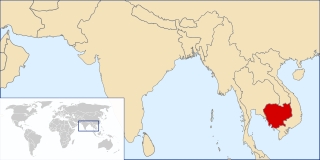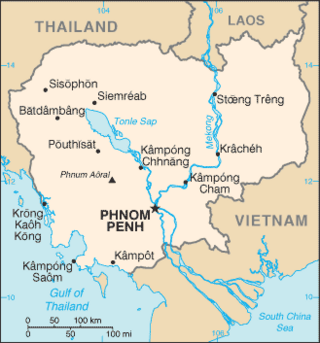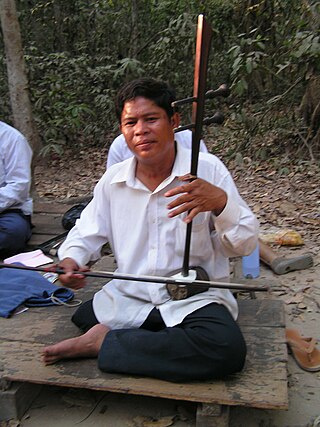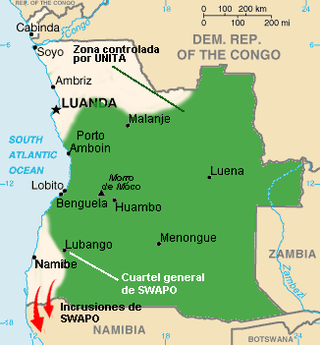
United Nations Security Council resolution 794, adopted unanimously on 3 December 1992, after reaffirming resolutions 733 (1992), 746 (1992), 751 (1992), 767 (1992) and 775 (1992), the Council "[expressed] grave alarm" regarding the situation in Somalia and authorised the creation of the Unified Task Force (UNITAF) to create a "secure environment for humanitarian relief operations in Somalia" in order to provide "essential for the survival of the civilian population". The current resolution determined that "the magnitude of human tragedy caused by the conflict in Somalia, further exacerbated by the obstacles being created to the distribution of humanitarian assistance [constitutes] a threat to international peace and security".

The United Nations Transitional Authority in Cambodia (UNTAC) was a United Nations peacekeeping operation in Cambodia in 1992–93 formed following the 1991 Paris Peace Accords. This was the first occasion in which the UN directly assumed responsibility for the administration of an outright independent state, rather than simply monitoring or supervising the area. The UN transitional authority organized and ran elections, had its own radio station and jail, and was responsible for promoting and safeguarding human rights at the national level.
FCU – UNTAC, the Force Communications Unit UNTAC, was the Australian component of the UNTAC mission in Cambodia.

United Nations Security Council resolution 668, adopted unanimously on 20 September 1990, after noting the ongoing political discussions and efforts regarding a just and lasting peaceful situation in Cambodia, the council endorsed the political framework that would enable the Cambodian people to exercise their right to self-determination through U.N. organised elections.

United Nations Security Council resolution 717, adopted unanimously on 16 October 1991, after noting a report by the Secretary-General Javier Pérez de Cuéllar and reaffirming Resolution 668 (1990), the Council decided to establish the United Nations Advance Mission in Cambodia (UNAMIC) immediately after the signing of agreements for a political settlement in Cambodia.

United Nations Security Council resolution 718, adopted unanimously on 31 October 1991, after recalling resolutions 668 (1990) and 717 (1991), and noting that at the Paris Conference, a political agreement was signed by parties to the situation in Cambodia, the Council authorised the Secretary-General to submit a report on the costs for the United Nations Transitional Authority in Cambodia, prior to its establishment.

United Nations Security Council resolution 728, adopted unanimously on 8 January 1992, after recalling resolutions 668 (1990), 717 (1991) and 718 (1991), the Council welcomed the implementation by all parties of the agreement in Paris on 23 October 1991, but expressed concern at the existence of land mines in Cambodia.

United Nations Security Council resolution 745, adopted unanimously on 28 February 1992, after recalling resolutions 668 (1990), 717 (1991), 718 (1991) and 728 (1992), the council, after examining a report by the Secretary-General Boutros Boutros-Ghali on 19 February 1992, authorised the establishment of the United Nations Transitional Authority in Cambodia (UNTAC), following on from the political settlement agreed in Paris on 23 October 1991. It was the first occasion where the United Nations had taken over administration of a state, as opposed to monitoring or supervising.

United Nations Security Council resolution 783, adopted unanimously on 13 October 1992, after recalling resolutions 668 (1990), 717 (1991), 718 (1991), 728 (1992), 745 (1992) and 766 (1992) and noting a report by the Secretary-General Boutros Boutros-Ghali, the council welcomed the progress the United Nations Transitional Authority in Cambodia (UNTAC) had made in Cambodia in accordance with the Paris Agreements, however it recognised various security and economic concerns facing UNTAC.
United Nations Security Council resolution 792, adopted on 30 November 1992, after recalling resolutions 668 (1990), 717 (1991), 718 (1991), 728 (1992), 745 (1992), 766 (1992) and 783 (1992) noting a report by the Secretary-General Boutros Boutros-Ghali, the Council concerned itself with preparations for the 1993 elections in Cambodia by the United Nations Transitional Authority in Cambodia (UNTAC) while condemning the refusal of the Party of Democratic Kampuchea to co-operate.

United Nations Security Council resolution 810, adopted unanimously on 8 March 1993, after recalling resolutions 668 (1990) and 745 (1992), the council, after deploring continuing political violence in Cambodia in violation of the Paris Agreements as well as attacks and detention of members of the United Nations Transitional Authority in Cambodia (UNTAC), discussed upcoming elections to the Constituent Assembly, as part of a process of national reconciliation.

United Nations Security Council resolution 826, adopted unanimously on 20 May 1993, after recalling resolutions 668 (1990), 745 (1992) and 810 (1993), the council supported the five million Cambodians who registered to vote despite violence and intimidation and discussed further preparations for the upcoming elections.
United Nations Security Council resolution 835, adopted unanimously on 2 June 1993, after recalling resolutions 668 (1990), 745 (1992), 810 (1993), 826 (1993) and other relevant resolutions, the council expressed appreciation for the United Nations Transitional Authority in Cambodia (UNTAC) in the aftermath of recent elections in Cambodia.

United Nations Security Council resolution 840, adopted unanimously on 15 June 1993, after recalling resolutions 668 (1990), 745 (1992), 810 (1993), 826 (1993), 835 (1993) and other relevant resolutions, the Council endorsed the results of the 1993 general elections in Cambodia.

United Nations Security Council resolution 851, adopted unanimously on 15 July 1993, after reaffirming resolutions 696 (1991), 747 (1992), 785 (1992), 793 (1992), 804 (1993), 811 (1993), 823 (1993) and 834 (1993), the Council noted the continuing deterioration of the situation in Angola and extended the mandate of the United Nations Angola Verification Mission II until 15 September 1993, discussing further the peace process in the country.
United Nations Security Council resolution 860, adopted unanimously on 27 August 1993, after recalling resolutions 668 (1990), 745 (1992), 840 (1993) and other relevant resolutions on Cambodia, the Council confirmed plans for the withdrawal of the United Nations Transitional Authority in Cambodia (UNTAC).

United Nations Security Council resolution 880, adopted unanimously on 4 November 1993, after recalling Resolution 745 (1992) and other relevant resolutions on Cambodia, the Council concerned itself with the withdrawal of the United Nations Transitional Authority in Cambodia (UNTAC) from the country.

United Nations Security Council resolution 882, adopted unanimously on 5 November 1993, after reaffirming resolutions 782 (1992) and subsequent resolutions on Mozambique, the council noted, in addition to positive developments in the country, that some aspects of the Rome General Peace Accords had not been implemented.

General elections were held in Cambodia between 23 and 28 May 1993. The result was a hung parliament with the FUNCINPEC Party being the largest party with 58 seats. Voter turnout was 89.56%. The elections were conducted by the United Nations Transitional Authority in Cambodia (UNTAC), which also maintained peacekeeping troops in Cambodia throughout the election and the period after it.
The Cambodian Constituent Assembly was a body elected in 1993 to draft a constitution for Cambodia as provided in the 1991 Paris Peace Agreements. The writing of the Cambodian Constitution took place between June and September 1993 and it resulted in the transformation of the political situation of Cambodia from civil-war-marred, autocratic oligarchy to a constitutional monarchy. Achieved under the guidance, auspices and funding of the United Nations Transitional Authority in Cambodia (UNTAC), the drafting of the constitution was the culmination of a larger, $1.6 billion effort to end the decades-old country’s civil wars and bring the warring parties into political, rather than military competition. The result of the process was the creation of a constitution for Cambodia that, at least on paper, guarantees free political competition, regular elections, equal rights and representation and universal suffrage.












